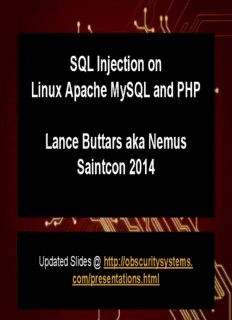
SQL Injection on Linux Apache MySQL and PHP Lance Buttars aka PDF
Preview SQL Injection on Linux Apache MySQL and PHP Lance Buttars aka
SQL Injection on Linux Apache MySQL and PHP Lance Buttars aka Nemus Saintcon 2014 Updated Slides @ http://obscuritysystems. com/presentations.html Who am I? Just some guy who likes computer security. I work as a PHP/Python application programer. I am a member of the local Defcon Group www.dc801.org Freenode #dc801. I help organize and run 801 Labs which is a hackerspace located in downtown Salt Lake City. 801 Labs Hacker Space www.801labs.org Disclaimer • The information provided in this presentation is to be used for educational purposes only. • I am in no way responsible for any misuse of the information provided. • All of the information presented is for the purpose of developing a defensive attitude in order to provided insight. • In no way should you use the information to cause any kind of damage directly or indirectly. • You implement the information given in this presentation at your own risk. • Contact a Lawyer for legal questions. Why Study Attacks? The best defense is a good offense. ● By understanding how SQLi attacks work one can understand what to look for when they expect a web server has been compromised or tampered with. ● By studying attacks it becomes clear how to identify the weak points of a web applications overall architecture. What is SQL Injection? SQL injection is a code injection technique used to attack an application by sending input from a user defined source that is later interpreted and executed by the SQL database. SQL injection attacks works because the input taken from the users input is combined unfiltered or filtered poorly with a SQL statements that is passed to the database and allows the user to manipulate the query. Prerequisites ● Familiarity with Linux, Apache, MySQL, PHP (LAMP). ○ Linux Operating Systems CLI ○ MySQL Databases and Basic SQL ■ http://www.w3schools.com/sql/sql_intro.asp ○ Apache Servers. ○ Basic PHP knowledge. ○ Understanding of HTTP POST and GET ■ http://www.w3schools.com/tags/ref_httpmethods.asp ● LAMP Setup ○ https://www.digitalocean. com/community/tutorials/how-to-install-linux-apache- mysql-php-lamp-stack-on-ubuntu Scenario Through the point of view of an attacker this presentation will demonstrate the discovery of a SQLi vulnerability, the damaging effect it can cause, and how an attacker could gain Remote Code Execution (RCE). Steps 1. Identify the vulnerability. 2. Fingerprint server. 3. Enumerate data from the database. 4. Upload a backdoor. Lab Setup Environment and Tools For this attack a curl script will be used to send malicious HTTP requests to a LAMP server. This will simulate a browser via command line. It should be noted that Burp Suite or Zed Attack Proxy Project could be used to do the same thing. This will make running tests easier and allow for the quick generate of malicious urls needed to exploit the web server. Curl Test Script #!/bin/bash curl --get --data-urlencode "id=$1" "http://127.0.0.1/get.php" root@testbox:/# ./get_curl.sh "1" http://127.0.0.1/get.php?id=1 -G, --get ● When used, this option will make all data specified with -d, --data, --data- binary or --data-urlencode to be used in an HTTP GET request. --data-urlencode ● performs URL-encoding http://www.w3schools.com/tags/ref_urlencode.asp http://curl.haxx.se/docs/manpage.html
Description: